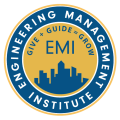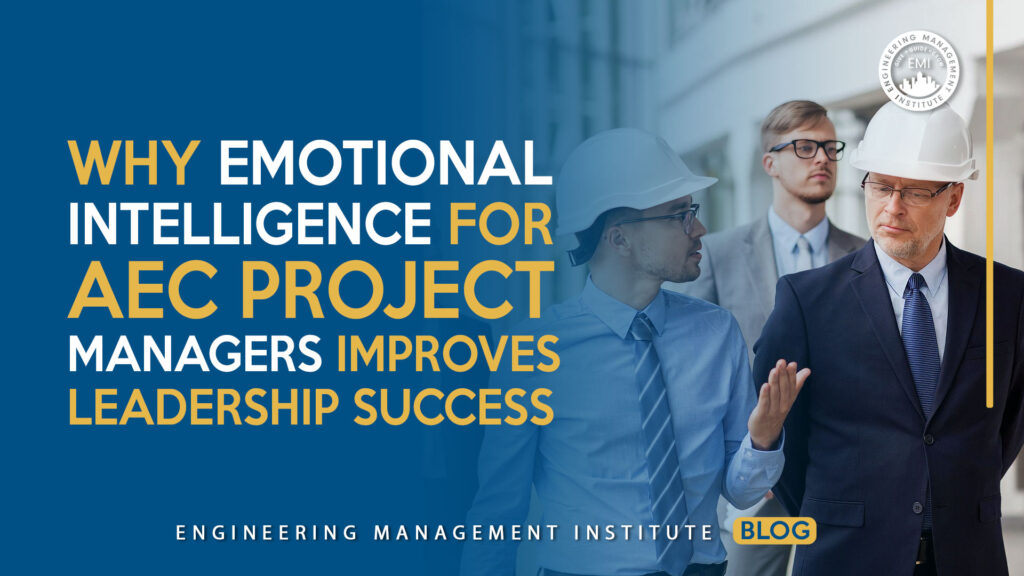In the architecture, engineering, and construction (AEC) industry, technical expertise has long been considered the cornerstone of success. But as projects grow more complex, teams become more diverse, and client expectations rise, one thing is increasingly clear: technical knowledge alone isn’t enough. What separates effective AEC project managers (PMs) and leaders from the rest is emotional intelligence (EI).
At the Engineering Management Institute (EMI), we view emotional intelligence for AEC project managers not as a “soft skill” but as a strategic leadership competency that drives project outcomes, team cohesion, and client trust. EMI’s leadership development programs consistently emphasize that EI is just as critical as technical know-how for today’s AEC professionals.
What Is Emotional Intelligence?
Emotional intelligence refers to the ability to recognize, understand, and manage our own emotions—and to recognize, understand, and influence the emotions of others. Core EI competencies include self-awareness, self-regulation, empathy, and relationship management.
For AEC PMs and leaders, these skills translate directly into project performance. Deadlines, budgets, and technical details matter, but it’s the people dynamics that often make or break a project.
Why AEC PMs Need Emotional Intelligence
1. Building Trust and Collaboration
AEC projects involve cross-disciplinary teams; each group brings its own perspective, and with that, a potential for conflict. A PM with emotional intelligence can sense tension early, facilitate dialogue, and create a climate of trust. This prevents miscommunications from spiraling into costly mistakes.
2. Managing Stress, Change, and Uncertainty
Construction delays, design changes, and client demands are going to happen. Leaders who regulate their own emotions are better equipped to remain calm under pressure, make clear-headed decisions, and model resilience for their teams. More importantly, emotional intelligence provides the foundation for navigating change and uncertainty. When a team feels supported, heard, and connected, they are far more adaptable and able to tackle shifting priorities and unexpected challenges without losing momentum.
3. Enhancing Client Relationships
Clients don’t just want a project delivered; they want to feel heard and valued throughout the process. Emotionally intelligent PMs actively listen, show empathy, and adapt communication to the client’s needs. This creates loyalty and positions firms for repeat business.
4. Driving Engagement and Motivation
Teams led by emotionally intelligent leaders are more engaged, motivated, and willing to go the extra mile. EMI’s programs highlight that recognition and authentic feedback, delivered with empathy, strengthen morale and reduce turnover, which is a major advantage in today’s competitive talent landscape.
How EMI Develops Emotional Intelligence in Leaders
Through specialized leadership training, coaching, and project management programs, EMI integrates EI into every learning experience. Participants learn not only how to manage scope, schedule, and budget, but also how to build trust, give effective feedback, and handle conflict with confidence.
By weaving emotional intelligence into project leadership, EMI prepares AEC professionals to guide teams and clients with both technical precision and human-centered leadership—equipping them to thrive in today’s dynamic and demanding industry.
Try This EI Exercise on Your Own
The “Pause and Label” Practice
1. At the end of your workday, take 5 minutes to reflect on one emotionally charged moment (positive or negative).
2. Write down:
-
What emotion you felt (e.g., frustration, pride, anxiety, relief).
-
What triggered it.
-
How you responded.
3. Then, ask yourself:
-
Did my response help or hurt the situation?
-
How could I regulate or express that emotion differently next time?
This exercise strengthens self-awareness (naming emotions) and self-regulation (thinking about alternative responses), two of the most critical EI skills for AEC project managers and leaders.
About the Author: Fiona Johann, PMP, AEC PM







